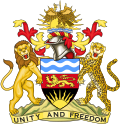National Assembly | |
|---|---|
 | |
| Type | |
| Type | |
| History | |
| Founded | 26 May 1964 |
New session started | 31 October 2025 |
| Leadership | |
Deputy Speaker | |
| Structure | |
| Seats | 229 |
 | |
Political groups | Government (78)
Independents (73)
Opposition (73) Vacancies (5)
|
Length of term | 5 years |
| Elections | |
| First-past-the-post | |
Last election | 16 September 2025 |
Next election | 17 September 2030 |
| Meeting place | |
 | |
| Lilongwe | |
| Website | |
| www | |
| Part of a series on |
|---|
 |
The National Assembly of Malawi is the supreme legislative body of the nation. It is situated on Capital Hill, Lilongwe along Presidential Way. The National Assembly alone possesses legislative supremacy and thereby ultimate power over all other political bodies in Malawi. At its head is the Speaker of the House who is elected by their peers. [2] Since October 29, 2025, the Speaker is Sameer Suleman.
Contents
The 1994 Constitution provided for a Senate, but Parliament repealed it. Malawi therefore has a unicameral legislature in practice. [2] The National Assembly has 229 members of Parliament (MPs) who are directly elected in single-member constituencies using the simple majority (or first-past-the-post) system and serve five-year terms. [3]